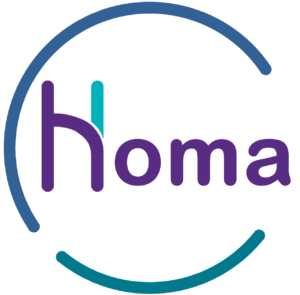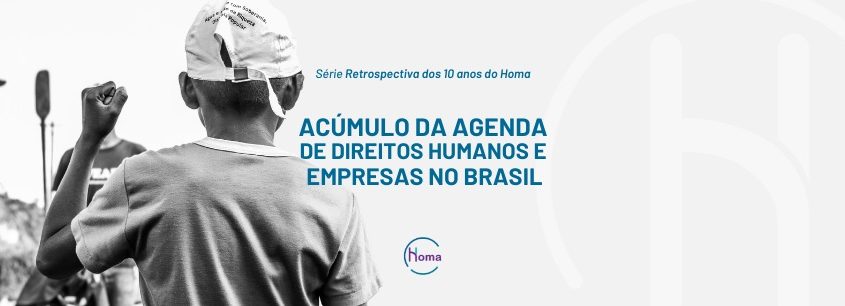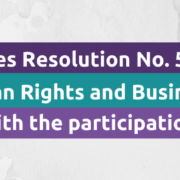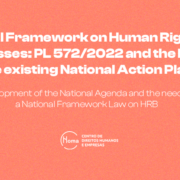Developments of the Human Rights and Business agenda in Brazil
Retrospective of the 10 years of Homa – Center for Human Rights and Business
Text by: Ana Laura Figueiredo
Continuing the retrospective series of the 10 years of Homa’s work, in which we highlight the main achievements and involvement in the Global and National Agendas, in this post, the last of the series, we will highlight the developments of the Human Rights and Business agenda in Brazil based on reflections on Decree 9.571/2018 and the involvement of HOMA in the production of Resolution 05/20 of the National Council of Human Rights and Bill 572/2022.
Decree 9.571/2018, which established National Guidelines on Business and Human Rights, was the first Brazilian rule on the agenda. Its publication was strongly criticized by civil society and legal institutions that recognized the lack of democratic legitimacy of the text and its relationship with the Brazilian political scene. The failure in the democratic and popular aspect is due to the construction ‘from top to bottom’, as had already been discussed in the 1st brazilian public hearing on Business and Human Rights in relation to National Action Plans, the subject of the last post.
The main points of the Decree are related to the reproduction of the voluntarist logic of the Guiding Principles, since there needs to be more clarity regarding the primacy of human rights, and the term ‘impact’ is adopted to refer to violations. Along with this, a policy of rewarding stamps is established for companies that adhere to the regulations, however, the relationship between them and the State could be clearer, with the only mention of agreements for conflict resolution. Important topics for the agenda, such as access to justice, and reversal of the burden of proof, are not addressed and the due diligence mechanism is foreseen without mentioning the reach of the productive chains.
In view of this scenario, civil society articulated the construction of Resolution No. 05/2020 of the National Council for Human Rights (CNDH), which was seen as a response and counterproposal to the Decree. Unlike this, the Resolution was concerned with the existing accumulation in the National Agenda for Human Rights and Business and with participatory construction. Thus, the text mentions constitutional principles and rights, international pacts to which Brazil is a signatory, ILO conventions, in addition to demonstrating concern with reports and technical notes.
It should be noted that the production of the document had the direct participation of civil society and that it was even debated during the VI International Seminar on Human Rights and Business, which took place in 2019 in Rio de Janeiro. This seminar was organized by HOMA in partnership with the CNDH, having also acted in the preparation of the base draft and in the advisory of the body throughout the process.
The main guidelines were the supremacy of human rights, the centrality of the victim’s suffering, self-determination, the recognition of power among the agents involved, the curbing of human rights violations throughout the production chain, rapid and comprehensive reparation and the specificity of negotiations carried out with indigenous peoples and quilombola communities.
Despite representing a great achievement for the National Agenda, the Resolution itself dealt with the importance of establishing a binding rule to effectively protect the rights of those affected in Brazil, considering the repeated violations of human rights by companies in the country. In this sense, a dispute of interests arises between the government, which aims to implement a Brazilian National Action Plan based on the text of Decree nº 9.571/18, and civil society organizations, as representatives of the interests of those affected, which joined forces in the elaboration of Bill 572/2022 based on a study developed by Homa with the support of the Friedrich Ebert Brasil Foundation.
The project, which had the collaboration of several civil society organizations such as CUT, MAB and Amigos da Terra Brasil, in addition to social movements and parliamentarians, was signed by Fernanda Melchionna (PSOL/RS), Áurea Carolina (PSOL/MG), Carlos Veras (PT/PE) and Helder Salomão (PT/ES) and filed on the 14th of March, a significant date as it is the International Day of Struggle for Those Affected by Dams.
Unlike existing regulations in the national agenda, the PL has broad and dense content. If approved, the law will make the entire production chain responsible, guarantee full reparation, ensure the right to consent, and enable the reversal of the burden of proof, among other provisions for prevention, monitoring, and reparation mechanisms. The content is an attempt at democratic radicalization within the National Agenda for Human Rights and Business, being an important and essential milestone for the fight to defend human rights in Brazil and in the world.
It should be noted that the search for approval of this Framework Law accompanies efforts to consolidate the International Treaty on Business and Human Rights. Thus, the campaign “This land has law – Rights for the people, obligations for the companies” was launched by the Corporações GT, a civil society working group, to strengthen the mobilization.












Leave a Reply
Want to join the discussion?Feel free to contribute!